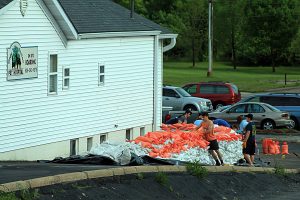
The Electrical Connection IBEW/NECA partnership is reminding St. Louisans in areas impacted by recent flooding to be wary of shock hazards in their homes and businesses and to carefully check the credentials of any company offering repairs.
Some electrical systems compromised by the flood may have to be inspected and repaired.
Electrical Connection is a partnership between the International Brotherhood of Electrical Workers (IBEW) Local 1 and the St. Louis Chapter of the National Electrical Contractors Association (NECA).
IBEW/NECA electrical contractors and union-trained electricians are available to work with government officials, residents and businesses to ensure electrical systems damaged by the recent flooding are made safe.
Residents and business owners should always use licensed electrical contractors for new electrical installations and electrical repairs. IBEW/NECA contractors are dedicated to strict adherence to the National Electrical Code to ensure safe electrical systems.
If you’ve been impacted by spring flooding, the Electrical Connection offers the following tips:
- Always ask for credentials to ensure the repair service is fully licensed.
- Call your insurance company first to find out what your insurance will cover and identify their procedures for how it will be covered.
- Never enter a basement with standing water that is in contact with electrical systems.
- With heavy rain, water can enter homes from faulty rooftop flashing to basements and in many cases the water trickles down electrical cables into fixtures. These fixtures, while they may look dry, should be inspected.
- The nonmetallic-sheathed cable (Romex) wiring used in most all dwellings has a paper-type material on the inside that will absorb water. Even though the appliance or outlet may look dry, the wiring may be completely wet.
- Any flickering lights may be a sign of hidden water damage and should not be used until inspected and repaired.
- Flooded sockets will have to be replaced as the waters could corrode the device and insulation.
- All dishwashers, laundry machines must be on ground fault circuit interrupters (GFCI) circuits.
The Electrical Connection offers the largest database of licensed electrical contractors at its website: electricalconnection.org.

